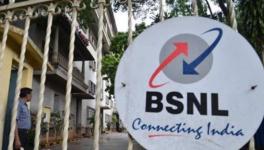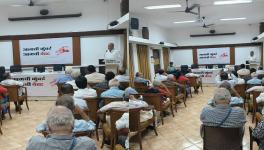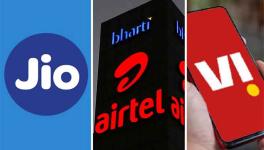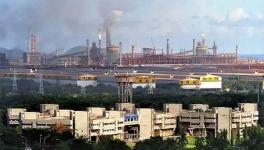Give Direct Budgetary Support to BSNL, MTNL; Regulate Pvt Telecom Players: PCPSPS
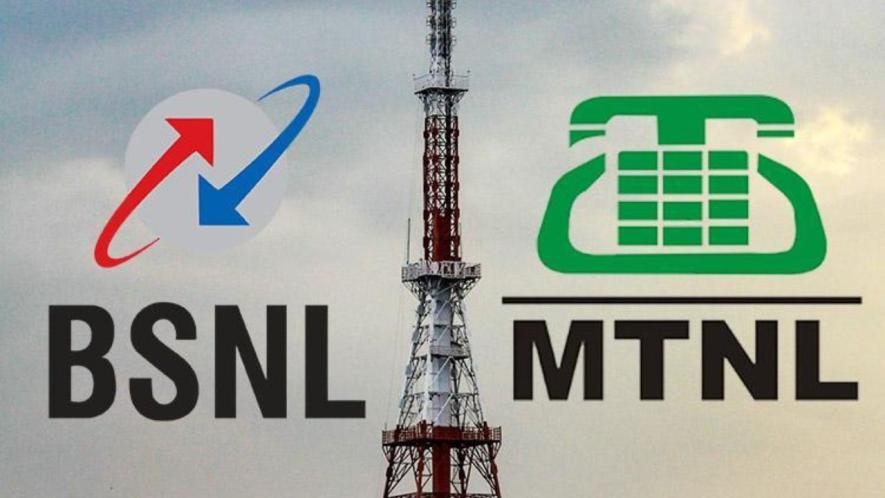
File Image
New Delhi: Expressing distress over the Central government’s “ham-handed” treatment of public sector telecom majors, BSNL and MTNL, to weaken them “financially, technically and organisationally, the Peoples’ Commission on Public Sector and Services (PCPSPS) has called for a “holistic revival plan” of these companies in national interest.
The PCPSPS, which includes eminent academics, jurists, erstwhile administrators, trade unionists and social activists, has also flagged the fleecing of millions of “unwary” customers by private telecom majors blaming the government for “dubious ways in which it has granted undue benefits to private telecom service providers, promoting a highly regressive monopolistic environment in the field of telecom services ….”
Ahead of the forthcoming Union Budget, a PCPSPS statement demanded that Central public sector enterprises (CPSEs), such as BSNL and MTNL, should get direct budgetary support to undertake a holistic revival plan “so that they may become technically and financially strong enough to compete with private operators in all denominations of spectrum.”
It also demanded that the plan to force BSNL/MTNL to monetise their lands, towers etc. be revoked as also the monetisation agreements already entered into with their private competitors.
Read the full PCPSPS statement below:
Statement of the People’s Commission on Privatisation of CPSEs and monetisation of their assets
Date: 03.10.2024
The People's Commission wishes to express its distress at the ham-handed manner in which the Centre has so far treated premier telecom CPSEs like BSNL and MTNL, the numerous ways in which it has weakened them financially, technically and organisationally, and the dubious ways in which it has granted undue benefits to private telecom service providers, promoting a highly regressive monopolistic environment in the field of telecom services at the cost of millions of unwary customers.
Privatisation of CPSEs and monetisation of their assets:
The NDA government, as a part of its wholesale, regressive CPSE privatisation campaign, has resorted to monetisation of their highly valuable assets, especially their land assets, by divesting CPSEs of control over them and alienating them to private entities. The justification put forward by DIPAM for this is that privatisation/ monetisation of CPSEs' assets would lead to improved efficiency of their management and generate additional fiscal resources for the government. Both those premises are fallacious for the following reasons.
In recent times, the privatisation of two important CPSEs, namely, CEL and Pawan Hans, both at an advanced stage of sale, got unceremoniously aborted under public pressure, as both turned out to be scams, though those responsible have not yet been proceeded against. Though the government showed enthusiasm at selling away BPCL, the proposal has since been put on the back burner as the government realised its futility. Though Air India had been sold to Tatas in haste more than two years ago, with the government taking upon itself the liability for its debt, the airline's performance has yet to come up to the expected level, nor has it reduced the costs and the tariffs.
The argument that privatisation of CPSEs and monetisation of their assets would generate additional fiscal resources for the government is equally fallacious, as private companies bidding for CPSEs and their assets raise funds from the same pool of savings in the economy which the government can tap directly on far better terms, without having to lose the benefit of using the CPSEs as instruments of social transformation as envisaged in the Directive Principles of the Constitution.
Monetisation of BSNL/MTNL's lands:
As a part of its large-scale asset monetisation exercise, the NDA government has been pressurising both BSNL and MTNL to alienate their lands to private companies to raise fiscal resources.
BSNL/MTNL's lands, originally acquired for them by the States under the erstwhile land acquisition legislation on the premise that such acquisition was for a "public purpose", defined in Section 3(f)(iv) of that legislation to imply that the lands so acquired were meant exclusively for companies wholly owned/controlled by the government. In other words, the lands now in the possession of BSNL/MTNL, thus acquired, cannot be alienated in any manner to a private entity. We understand that the NDA government has been coercing BSNL/MTNL to sell their lands, which implies that either the government is blissfully unaware of the illegality involved or is brazenly defiant of the rule of law.
It is equally objectionable for the Centre to have taken such a unilateral decision without consulting the States, as it was the States that invoked their "eminent domain" authority to acquire those lands in the first instance. Such an approach constitutes an affront to the spirit of federalism that lies at the core of our Constitution.
Monetisation of BSNL's towers:
We understand that BSNL is also being pressured to lease out thousands of its towers and long stretches of its fibre optic network to its competitors on terms not necessarily advantageous to itself, granting the latter an undue benefit at its cost.
As at the end of March, BSNL had 67,340 towers nationwide and had leased out 13,146 towers to private telecom operators. Out of this, BSNL leased out 8363, 2779 and 1782 mobile towers to Reliance Jio, Bharti Airtel and Vodafone Idea respectively.
In our view, keeping in view the conflict of interest between BSNL and its competitors, forcing BSNL to lease out its towers to its competitors amounts to a serious impropriety on the part of the government.
Why should private telecom service providers be preferred to BSNL in the matter of extending connectivity to remote areas?
In the past, BSNL with its extensive network of towers used to enjoy the privilege of providing connectivity in remotest areas of the country. In the normal course, keeping in view the sensitive nature of many such remote areas, a CPSE like BSNL should have been entrusted with the exclusive responsibility of serving such areas in preference to private operators, backed by support from the Universal Service Obligation Fund (USOF).
Contrary to this, in a clear effort to benefit chosen private telecom operators, the Department of Telecommunications (DOT) has chosen them to get access to strategic areas like Ladakh, in preference to BSNL. We feel that it is against the national interest.
Weaken BSNL/MTNL and grant undue favours to private telecom oligarchs:
The DOT opened the floodgates in the telecom sector in 2014 to private companies when it resorted to allocating 4G spectrum to them in a highly non-transparent manner, leaving BSNL out of the exercise. This marked the beginning of a few private oligarchs emerging in the telecom sector at the cost of a premier CPSE like BSNL and to the detriment of the interests of the customers. After the apex court’s landmark judgement in 2008, the NDA government started subjecting spectrum sales to private companies through auctions but, with only a few private companies bidding, that too on a selective basis, for a few spectrum ranges of their choice, the auction process turned out to be highly non-transparent and non-competitive, giving rise to a monopolistic situation. More recently, highly valuable 5G spectrum bands were handed over to a few private companies in a similar non-competitive manner to the detriment of the public interest.
Since 2014, the government, for reasons best known to it, has systematically marginalised the role of BSNL, MTNL and other CPSEs, which in effect allowed the private players to have their way. Meanwhile, the government, in the name of “digitisation” of utility services, started insisting on all financial transactions, including those relating to transactions covered under different welfare schemes of the government, to be linked to the Aadhar numbers of those involved in the transactions. This has placed the personal data of millions of Aadhar card holders in the country in the hands of the telecom operators. In the absence of adequate security safeguards, there have been complaints about the personal information of millions of telecom customers slipping away into the wrong hands, leading to numerous instances of the customers’ bank accounts being hacked.
On the other hand, with their dominant presence in the 4G and 5G spectrum ranges, private operators resorting to predatory pricing practices slowly edged out BSNL, often with the tacit approval of DOT.
As a result of pressure from CPSEs’ employees’ unions, the government announced a waiver of BSNL’s dues and some nominal financial revival packages, which were linked to the CPSE retrenching its personnel in the name of a Voluntary Retirement Scheme, actually a misnomer for compulsory retirement. The financial revival packages were not well thought out and they were never meant to revive BSNL to such an extent that it could regain its premier status in the telecom sector, and become financially, technologically and organisationally strong enough to withstand competition. Had BSNL been allowed to function on a level playing ground vis-a-vis its competitors in the matter of upgradation of technology and entry into 4G and 5G spectrum ranges, it would not only have played its expected premier role in the telecom sector but also offered strong competition to private players and forced them to deliver telecom services of high quality at affordable tariffs to customers.
BSNL’s dues vis-a-vis Private Telecom players’ NPAs:
It is interesting to note that while private operators together owed about 5 lakh crores to Public Sector Banks (PSBs), the debt of BSNL was hardly Rs 15000 crores. In other words, the private telecom operators earned profits not only at the cost of BSNL but also at the cost of the PSU banks who were forced to extend loans to private operators, which later became NPAs burdening the banks.
Vodafone-Idea has become debt-ridden and has approached GOI for relief of its Adjusted Gross Revenue(AGR) of Rs 70000 Crores. When this Aditya Birla group company was going bankrupt, GOI saved it by buying a stake in VIL. The company’s payment obligation to the Govt as of June 30, 2024, is Rs 2,09,520 Crores as per the TOI report dated Sept 2024.
On 19th Sept 2024, the Supreme Court rejected a curative petition of its order of 2019 filed by VIL and Bharti Airtel who owe Rs.1.47 trillion. The Govt keeps giving concession after concession, finance and dues are not collected from the Private Companies whereas the Public Sector Companies are given a step motherly treatment.
The entry of the Tata Group:
After BSNL was denied 4G Spectrum use for 12 years, the Tata group was given an order to supply technology and equipment for 4G services to BSNL. A contract has been signed between BSNL and Tatas through which the latter will get complete control over BSNL’s 4G services implementation. For manufacturing equipment for 4G services, Tatas have been allowed free use of services of Central government undertakings like C-dot and ITI. Tatas have been given free use of the facilities of ITI, a CPSE to manufacture RRUs (Remote Radio Units) and BBUs (Base Band Units). RRUs and BBUs are required to be installed on the towers for the 4G network. Tata’s are using three manufacturing plants of ITI at Bangalore, Palaghat and Mangapur (UP). They forced ITI to spend Rs. 60 crores for building the infrastructure to manufacture these items and are giving ITI only a 2% margin for making these hardware items. They have put the TCS nameplate outside these 3 factories. They are literally using the facilities and infrastructure of ITI for free.
The same Tatas took over Videsh Sanchar Nigam Limited (VSNL), a PSU which provided the first internet connection in our country in 2008( by Tata Communications), Promoted TATA DOCOMO (Tata Teleservices) but could not survive with its technology and closed it down in 2017.
All these developments give a feeling that the DOT is preparing the ground for privatising telecom CPSEs in due course.
Revival of BSNL - is it being revived for privatisation?
After continued struggle by workers for 4G spectrum entry, the government announced in 2019 that 4G spectrum will be allotted to BSNL. Rs. 80,000 crore was given to BSNL in the name of revival. Out of that, as already indicated, Rs. 70,000 crore went into VRS, a misnomer for a compulsory retirement scheme. Nearly 80,000 workers were forced to take VRS because they feared a bleak future, with transfers and the closure of their offices.
Today about 50% of BSNL activities are outsourced, and the engineers who work for contractors are often underpaid.
Private telecom operators hiked tariffs unilaterally post non-competitive 5G spectrum auctions
Private telecom service providers unilaterally hiked up tariffs by 20-25% without any questions being asked either by the DOT or by TRAI. Such an unconscionable increase in tariffs has allowed those private telecom service providers to earn huge profits at the cost of millions of helpless customers.
The National Telecom Policy envisaged the setting up of a Telecom Ombudsman but no tangible action has yet been taken. As on date, there is no effective arrangement to regulate telecom tariffs and safeguard the interests of the customers. In this matter, TRAI has remained inactive for reasons best known to it.
In particular, the National Telecom Policy envisaged the strengthening of telecom PSUs like BSNL and MTNL but the manner in which DOT has been brazenly promoting the interests of private telecom service providers runs counter to that.
Strengthening the two telecom CPSEs, BSNL and MTNL, would introduce much-needed competition in the telecom sector and it could go a long way towards protecting the interests of the customers. Had the government cared for upholding the interests of the customers, it would have gone all out to extend budgetary support for reviving BSNL/MTNL without any reservation.
When the government has had no hesitation whatsoever to extend huge open-ended subsidies to profit-earning private companies, including a foreign company like Micron, in the guise of PLI and PLI-like schemes, there is no justification for it not to extend budgetary support for reviving strategic CPSEs like BSNL, MTNL and RINL.
Undue emphasis on the digitisation of utility services, that forces beneficiaries to acquire expensive smartphones:
As already stated, the Centre's excessive insistence on digitisation of utility services such as rural workers drawing their wages on the basis of Aadhar linkage and associated OTP authorisation has forced beneficiaries to acquire expensive smartphones they cannot afford. Also, the majority of mobile devices being of foreign origin, especially of Chinese origin, it has not only increased the country's dependence on imports but has also hurt the national interest.
An independent enquiry called for to affix responsibility for private telecom operators being granted undue benefits:
Against this background, it is evident that the manner in which DOT, DIPAM and the Ministry of Finance have gone about, openly favouring a few profiteering private telecom service providers at the cost of BSNL/MTNL, the telecom customers and the public at large is a matter that involves serious illegalities and improprieties, which need to be subject to an independent enquiry so that the concerns expressed above may be subject to a wider discussion and debate in the Parliament and among the public.
Strengthen BSNL/MTNL to further national interest:
We feel that the Centre should regulate profiteering private telecom service providers and strengthen BSNL/MTNL and other public sector telecom institutions by proceeding as follows:
1. Undertake a holistic revival plan for BSNL/MTNL and other public sector telecom institutions by providing direct budgetary support so that they may become technically and financially strong enough to compete with private operators in all denominations of spectrum.
2. Revoke the plan to force BSNL/MTNL to monetise their lands, towers etc. and also revoke the monetisation agreements already entered into with their private competitors.
3. Strengthen the R&D capabilities of BSNL/MTNL and other public sector telecom institutions so as to enable the country to achieve self-reliance in the field of telecommunications.
4. Set up an independent telecom ombudsman to protect the interests of the customers as envisaged in the National Telecom Policy of 2018.
Get the latest reports & analysis with people's perspective on Protests, movements & deep analytical videos, discussions of the current affairs in your Telegram app. Subscribe to NewsClick's Telegram channel & get Real-Time updates on stories, as they get published on our website.









